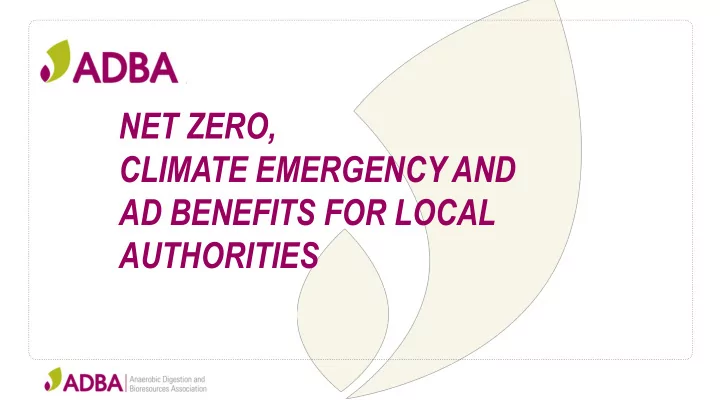

NET ZERO, CLIMATE EMERGENCY AND AD BENEFITS FOR LOCAL AUTHORITIES
Anaerobic Digestion & Bioresources Association • Represent and support the UK AD market. Established September 2009 • Training days. Objective to break • Operator and working groups. Speaking down the barriers with a single, and build a mature, united voice • Member events – Regulatory Forum, Members’ safe industry Meetings. • Policy and Regulation Team – Member queries Working and issues, consultations responses and collaboratively 400+ members, lobbying. with government representing all of the and related key AD industry • ADCS - Anaerobic Digestion Certification sectors sectors Scheme
1. Climate Emergency Climate change is a result of rising levels of carbon dioxide, and other gases such as methane, trapping the sun’s energy in the atmosphere and causing the planet to heat up – resulting in the greenhouse effect. The higher the amount of greenhouse gases, the warmer the Earth becomes. As the climate changes, some extreme weather events occur more frequently causing unpredictable consequences. 2019 has been the most active year for forest fires in the Amazon in recent history, while the Greenland ice sheet is melting at an unprecedented rate – which climate models predicted for 2070 in the worst-case scenario. Today, in the context of the UN Convention on Climate Change, only 2 countries have plans in place which would keep the rise in temperature below 1.5 degrees – Morocco and Gambia.
1. Climate Emergency Socio-economic Consequences - Increased uncertainty - Forced migration - Political instability - Lack of appropriate resources - Low quality of life - Social unrest
2. Net-Zero in UK by 2050 The components required towards the net-zero achievement are as follows: i. Low-carbon electricity ii. Efficient buildings and low-carbon heating iii. Decarbonisation of the transport sector iv. Carbon capture and storage (CCS) v. Diversion of biodegradable waste from landfill vi. Phase-out of fluorinated gases vii. Increased afforestation viii. Measures to reduce emissions on farms
3. ADBA’s Vision We must have a greater respect for the resources we use and the full value they can deliver. AD sits at the heart of our circular economy, being able to recycle our organic waste into energy and valuable fertiliser for the soil. Already achieving a 1% reduction in total emissions per year, the AD industry could increase this to 5% if all potential feedstocks can be utilised, which is equivalent to wiping out all emissions from heavy goods vehicles in the UK.
4. Anaerobic Digestion Anaerobic digestion is one of the methods of generating energy from bio-waste. It involves the transformation of organic matter into biogas in an anoxic environment when acted upon by anaerobic bacteria.
4. Anaerobic Digestion Benefits : Preserves phosphates, nitrates and other • • AD is a proven technology in water industry nutrients and produces a valuable biofertiliser • Alternative to landfill and incineration (digestate) • Constant generation Reduces carbon emissions • • Can be stored in the grid/compressed Generates renewable energy (biogas) - can • • Relatively cheap replace natural gas, be used as a transport • Relatively fast rollout fuel or fed into a CHP engine to generate electricity and heat)
AD technology, equipment and expertise will become 5. Business Engagement an important commodity, worth approximately £9.7 billion, for export to a global industry that can supply 7% of energy worldwide and decarbonise the global ─ AD can be deployed on industrial sites, farms, economy by 12%. schools, golf courses, etc. ─ AD can be considered in conjunction with other The development of a more circular renewable resources for maximum energy efficiency economy is of critical importance. ─ AD is associated with hard-to-decarbonise sectors (public transport, heavy-goods transportation, aviation, agriculture) ─ Different by-products are currently being researched (biorefinery can produce platform for chemicals, bioplastics, and microbial protein; hydrogen, CO2)
6. AD Benefits to Local Authorities 1. Waste management: a) Household waste b) Industrial and agricultural waste c) Sewage 2. Securing/improving investments in municipal infrastructure 3. Cooperation with private individuals, as well as industries on safety and security through common practices 4. Securing and developing employment in green, new jobs 5. Educationally smart: Shows how green economy evolves together with the community/citizens
7. ADBA Lobbying Activities and Consultations ― AD must be better supported to achieve more plant deployment, incentivise best practice, and focus on environmental outcomes ― RHI and Biomethane future policy ― Infrastructure network developments ― Waste management and circular economy planning ― Clear policy asks for the agricultural sector ― Commercialisation of AD technology ― Close work with businesses
Thank you. Viktoryia.Nestserava@adbioresources.org
Recommend
More recommend